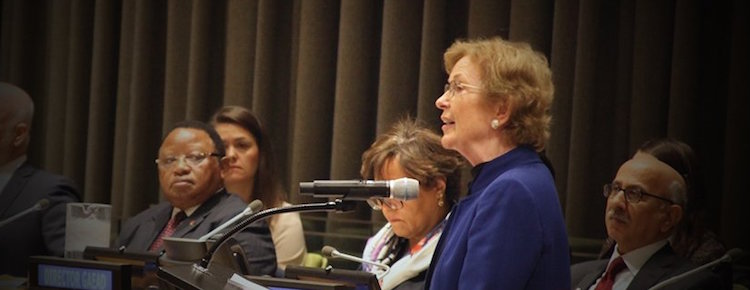By Jaya Ramachandran
This report is based on an unofficial record of the Economic and Social Council 2017 Session, Partnership Forum (ECOSOC/6821) on April 5, 2017. – The Editor.
NEW YORK (IDN) – “The clock is ticking and we have no time to waste” amid climate change, rapid urbanization, mass movements of people and other global trends affecting communities and financing worldwide, said Amina Mohammed, Deputy Secretary-General of the United Nations in a video message to the day-long Economic and Social Council (ECOSOC) Partnership Forum on April 5.
The 2030 Agenda had set the bar high and partnerships were key to supporting the Sustainable Development Goals and ensuring their success. In fostering partnerships, critical elements included delivering results on the ground, providing effective financing and garnering significant private-sector investment, the Deputy Secretary-General added.
Yet, she said, how those investments were directed would affect results such as job creation and addressing climate change. Local, national and regional partnerships were equally important and young people needed to be empowered to become part of those widespread changes.
Promoting effective partnerships would entail including innovation and finding new ways to move forward. “We have a once-in-a-generation opportunity and we can’t afford to fail,” she said, “but nothing is impossible when we work together in partnership.”
The Economic and Social Council Partnership Forum had ‘partnerships for promoting opportunities, increased prosperity and sustainable development for all’ as the central theme. The focus was on addressing the 2030 Agenda for Sustainable Development and Sustainable Development Goal 9 – building resilient infrastructure, promoting sustainable industrialization and fostering innovation.
Central to discussions was promoting infrastructure development, particularly in Africa, the least developed countries, landlocked developing countries and small island developing States, which faced the largest gaps in that sector.
Delivering a keynote address, Mary Robinson, President of the Mary Robinson Foundation – Climate Justice, the United Nations High Commissioner for Human Rights, from 1997 to 2002, said “we cannot just continue with business as usual” as a range of current situations were untenable.
Elaborating on some of those challenges, she said the Elders, an independent group of global leaders working for peace and human rights, had issued a strong message about famine affecting four African countries. “Any country facing famine in the twenty-first century is an indictment against all of us and we should hang our heads in shame,” she said. Also disgraceful was the ongoing war in Syria. In addition, addressing the existential threat of climate change was another colossal challenge.
In 2015, she said, world leaders had, with the 2030 Agenda, demonstrated a clear understanding that no one country alone could protect its citizens from climate change and, with the Paris Agreement, had committed to adopting new approaches. A new paradigm must be created to replace the current silo landscape to foster a global solidarity to reach the world’s most vulnerable people.
Recent waves of populism had been seen in many countries, but it was clear that taking climate action now was imperative. The 2030 Agenda focused on reaching those most in need. Some of the world’s poorest countries were leading climate action.
Inspired by their call for a new era for development, addressing climate change and leaving no one behind, she said climate justice was the antithesis of short-term thinking. More carbon emissions were detrimental on many levels. The question now was whether countries had a choice between economic growth and sustainable alternatives in, for example, building infrastructure. To answer that question, a new wave of infrastructure investment must provide a guide to supporting sustainability.
However, she said, not all action that was good for the planet was good for people and climate justice needed to prevail. Local communities must be consulted, she said, providing examples of renewable energy projects that had infringed upon rights. Civil society was a key player in that regard.
Going forward, there was a risk that States could withdraw from commitments they had made and choose to work alone. The same spirit that had been seen after the Second World War was needed now, she said. A new level of consciousness was needed to rise above the challenges of the time and reach a common ground pursuing shared values.
Ambassador Frederick Musiiwa Makamure Shava of Zimbabwe, Economic and Social Council President, said the fight for a healthier planet could only be achieved by joining forces. “To achieve sustainable development for all, we are going to need strategic partnerships that will deliver strong results,” he said, underlining the importance of transparency and accountability.
Agreeing, General Assembly President Fiji Ambassador Peter Thomson said securing a sustainable future would require letting go of old grievances and scepticism in favour of working together through new and inclusive ways of thinking, financing and delivering results.
“We must embrace partnerships as a fundamental part of the solution,” he said, adding that it was critical to explore ways to bring together stakeholders from Governments at all levels, the United Nations, international financial institutions, civil society, the private sector, academic and scientific communities, technology leaders and innovators, philanthropic institutions and grass-roots organizations.
During the day-long meeting, round-table discussions were held on “Innovative Partnerships for resilient infrastructure, including in countries in special situations” and on “Principles and guidelines governing United Nations-associated partnerships”. [IDN-InDepthNews – 10 April 2017]
Photo: Mary Robinson addressing the ECOSOC Partnership Forum on April 5, 2017. Credit: UN
IDN is flagship agency of the International Press Syndicate
facebook.com/IDN.GoingDeeper – twitter.com/InDepthNews

